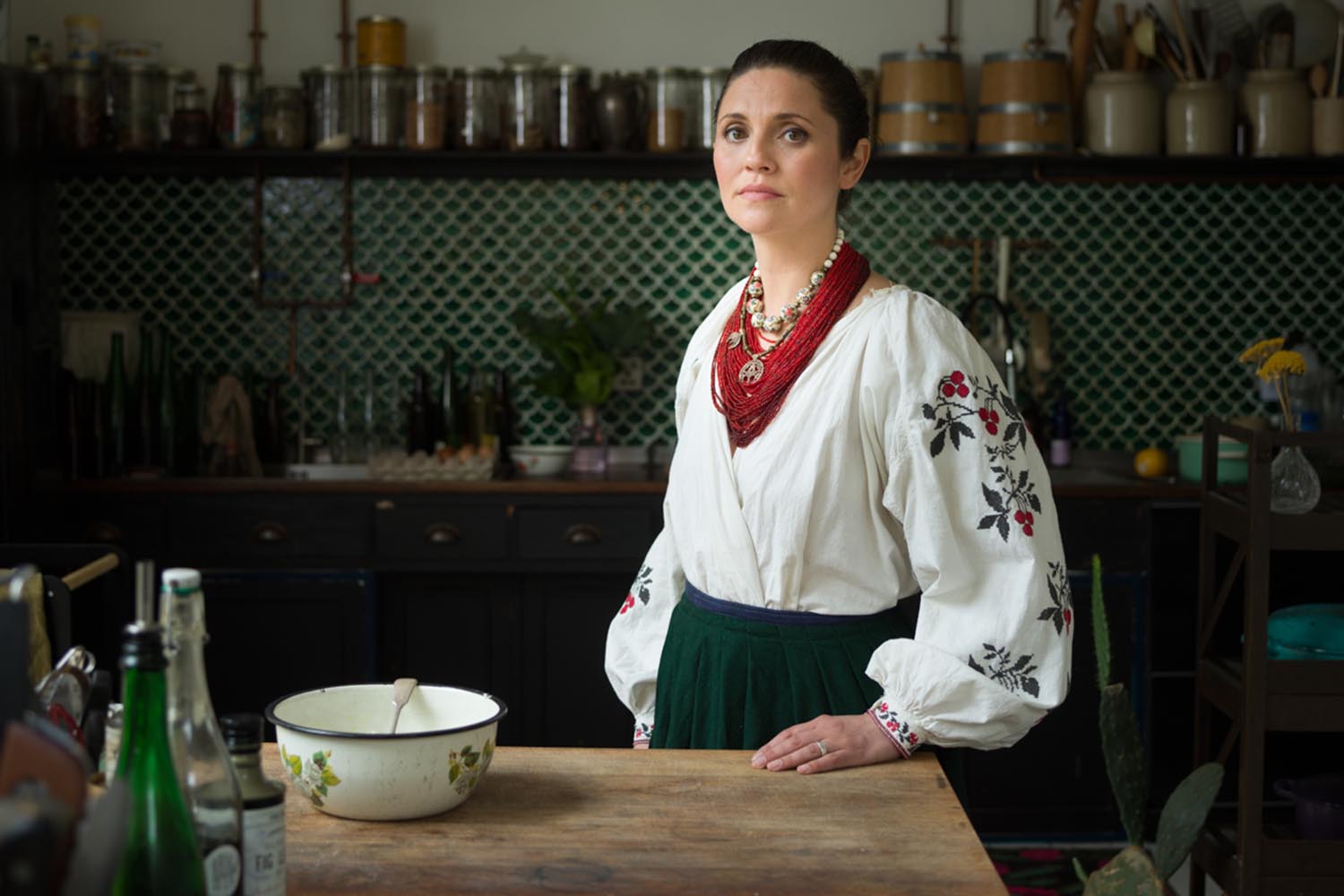For those familiar with Olia Hercules’s earlier books, Strong Roots is a step aside: an experiment, a bold attempt to combine themes that would usually be covered in separate volumes. It is both a history of Ukrainian gastronomic culture – drawing on the array of social and political phenomena that form culinary traditions – and a family saga played out against the background of Ukraine’s Soviet and post-Soviet life.
Hercules portrays the Soviet period on a broad canvas dominated by war, as members of her family are forced to move to Siberia and beyond, and then back to Ukraine. Displacement shapes the biography of every character in the book, including its author.
There is a lot of Olia Hercules in Strong Roots. The well-known food writer and chef plays two parts at once – her usual self, and a more unfamiliar role of gastronomic anthropologist.
With unflinching honesty, Hercules describes how the Soviet regime set about eradicating any hint of potential hedonism in its citizens. When families had to live in large “communal” apartments, sharing a single kitchen, cooking became a simple process of digestion – a fixed set of tasteless dishes that filled stomachs so that there was enough energy for socialist labour. Even under these conditions, Soviet people managed to create some simple and cheap “festive” recipes, which have remained in post-Soviet cuisine. For example, the so-called Russian salad, otherwise known as “Olivier salad” (after the chef Lucien Olivier), is still enjoyed by many in both Russia and Ukraine – and at the same time hated and criticised by a younger generation of Ukrainians who see it as a relic of Russian rule.
Hercules affectionately describes the culinary traditions of the Ukrainian village, including minute details of kitchen life. She brings these right up to date with her treatment of the clash between Russia and Ukraine over the origins of borscht, the soup that is a staple in both countries. The conflict culminated in July 2022 with the inclusion of the culture of Ukrainian borscht cooking on the Unesco list of “intangible cultural heritage”.
It is a striking paradox that Soviet peasants, who were not given passports until the mid-1960s and who could not go shopping in a big city without permission from their superiors, had more gastronomic freedom than urban dwellers. I was especially happy to be reminded of details that continue to characterise rural, Ukrainian households, like the tradition of having two kitchens: a winter one, inside the house; and a summer one, in a separate wooden shed, with windows and a door opening on to the yard where a table and benches stand waiting for al fresco family meals.
She describes how the Soviets set about eradicating any hint of hedonism in its citizens
She describes how the Soviets set about eradicating any hint of hedonism in its citizens
Hercules has chosen not to create a chronological history. She is a storyteller, and like any good storyteller, she is often carried away – sometimes to the distant past, sometimes to the day before yesterday. By imagining how past generations of her family would describe their experiences, Hercules brings to life great-grandmothers, aunts and uncles – allowing them to explain how they fell into the millstone of the Soviet system and how they tried to escape; how they faced moments of high drama and political traps, which they sometimes succeeded in avoiding.
Reading Strong Roots, 100 years of Ukrainian history, including the events after the 1917 Russian Revolution, flash past and you witness disasters, dramas and miraculous rescues. My favourite story in the book, however, is from Hercules’s own biography – the account of a journey to her homeland in southern Ukraine in the summer of 2014, after the annexation of Crimea and the beginning of the war in Donbas. The author made the trip to the region with a photographer, Chris, aiming to create a record of dishes and recipes that were in danger of disappearing in the face of Russian aggression. This story took my breath away. What they both achieved, risking their lives, can only be described as a heroic mission to preserve the gastronomic folklore and traditions of a community.
Hercules’s thought-provoking book is full of sparkling images and powerful insights into the relationship between food and society. The sad reality is that the current war is, indeed, killing culinary traditions. The occupiers arrive with their habits and impose them on local people. Russian soldiers from Buryatia and Bashkiria have brought their cuisine with all its rituals to the occupied territories of Ukraine. Today, thousands of Uzbeks and Tatars live and work in Mariupol. They have opened cafes and taverns that serve their traditional food. Ukrainians who find themselves under occupation will still cook borscht, perhaps even seeing it as an act of resistance, as a new chapter in Ukrainian culinary history is written.
Strong Roots: A Ukrainian Family Story of War, Exile and Hope by Olia Hercules is published by Bloomsbury (£20). Order your copy at observershop.co.uk. Delivery charges may apply
Newsletters
Choose the newsletters you want to receive
View more
For information about how The Observer protects your data, read our Privacy Policy
Photograph by Pål Hansen for the Observer
